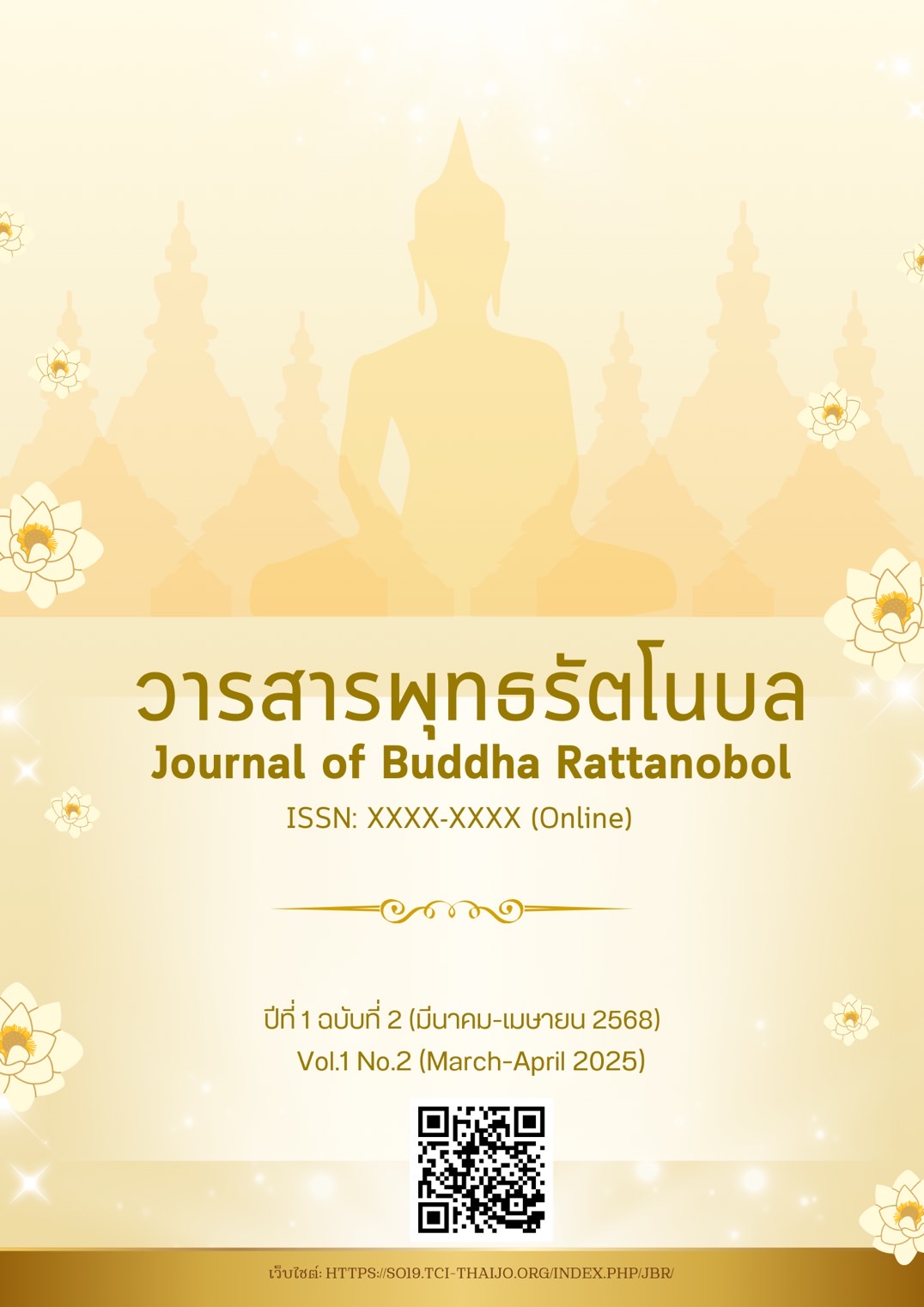Guidelines for Managing Buddhist Tourism
Main Article Content
Abstract
Buddhist tourism is a form of travel that emphasizes learning and practicing Buddhist teachings, contributing significantly to the spiritual and moral enrichment of visitors while fostering deeper faith and understanding of the religion. This study aims to explore effective and sustainable management practices for Buddhist tourism through qualitative data analysis from interviews with key stakeholders, including monks, religious scholars, government agencies, and tourism operators.The findings indicate that successful management of Buddhist tourism requires consideration of several key factors: 1) Preservation and restoration of significant Buddhist sites to maintain their historical and religious value. 2) Development of infrastructure and facilities, such as travel routes, signage, and accommodations, to enhance visitor convenience. 3) Establishment of collaborative networks between various entities at both local and national levels to promote integrated management efforts. 4) Alignment of tourism activities with Buddhist principles and lifestyles, including meditation retreats, Dharma talks, and participation in religious ceremonies.Furthermore, the study highlights challenges in managing Buddhist tourism, such as controlling excessive tourist numbers, which may impact the sanctity of sacred sites, and addressing misunderstandings of Buddhist teachings among some visitors. Additionally, the lack of consistent government support poses a significant obstacle. Therefore, developing comprehensive and appropriate management strategies is essential to ensure the sustainability of Buddhist tourism while preserving its religious and cultural values in the long term.
Article Details

This work is licensed under a Creative Commons Attribution-NonCommercial-NoDerivatives 4.0 International License.
References
กรมการศาสนา กระทรวงวัฒนธรรม. (2557). ราชกิจจานุเบกษา เล่ม 131 ตอนที่ 89 ก.
ธงชัย สันติวงษ. (2543). องค์การและการบริหาร (พิมพ์ครั้งที่ 11). กรุงเทพฯ: ไทยวัฒนาพานิช.
ธนกฤต สังข์เฉย. (2550). อุตสาหกรรมการท่องเที่ยวและบริการ. เพชรบุรี: คณะวิทยาการจัดการ มหาวิทยาลัยศิลปากร วิทยาเขตสารสนเทศ.
ปริญญา เฉิดโฉม. (2554). แนวคิดและทฤษฎีทางมานุษยวิทยา. สงขลานครินทร์. (อัดสำเนา).
พระธรรมโกศาจารย์ (ประยูร ธม.มจิตฺโต). (2549). พุทธวิธีในการบริหาร (พิมพ์ครั้งที่ 4). กรุงเทพฯ: โรงพิมพ์มหาจุฬาลงกรณราชวิทยาลัย.
พระมหาสุทิตย์ อาภากโร และคณะ. (2556). การพัฒนารูปแบบและกระบวนการจัดการท่องเที่ยวทางพระพุทธศาสนาในประเทศไทย. สถาบันวิจัยพุทธศาสตร์: มหาวิทยาลัยมหาจุฬาลงกรณราชวิทยาลัย.
สมคิด บางโม. (2534). หลักการจัดการ (พิมพ์ครั้งที่ 2). กรุงเทพฯ: บริษัท พิมพดีจำกัด.
สมคิด บางโม. (2544). การบริหาร. กรุงเทพฯ: โรงพิมพ์มหาวิทยาลัยธรรมศาสตร์.
สมพงศ์ เกษมสิน. (2523). การบริหาร (พิมพ์ครั้งที่ 7). กรุงเทพฯ: สำนักพิมพ์เกษมสุวรรณ.
สุดาทิพย์ นันทโชค. (2556). พฤติกรรมการท่องเที่ยวเชิงศาสนาในเขตจังหวัดสิงห์บุรีของนักท่องเที่ยวสูงอายุ. วารสารปัญญาภิวัฒน์, 5(1), 32.
เสนาะ ติเยาว์. (2544). หลักการบริหาร. กรุงเทพฯ: มหาวิทยาลัยธรรมศาสตร์.
วิวัฒน์ชัย บุญยภักดี. (2531). วัด : จำเป็นอย่างไรจะต้องมีคู่มือพัฒนา. จุลสารการท่องเที่ยว, 7(1), 73-77.
อารีย์ นัยพินิจ และคณะ. (2556). การศึกษาศักยภาพการท่องเที่ยวเชิงศาสนาของวัดในกลุ่มจังหวัดร้อยแก่นสารสินธ. วารสารปัญญาภิวัฒน์, 5(1), 31-32.
Dale, Y. (1956). Personnel Principles and Policies (4th ed.). Englewood Cliffs, NJ: Prentice-Hall.
Goeldner, C. R., and Ritchie, J. R. B. (2006). Tourism: Principles, Practices, Philosophies (10th ed.). Hoboken, NJ: J. Wiley.
Gross, B., and Brown. (2008). Organization Theory and Management: A Macro Approach. New York, NY: Wiley & Sons.
Ismail, R. (2008). Development of a Normative Model for Cultural Tourism on The Cape Flat (Master’s dissertation). Cape Peninsula University of Technology.
Koontz, H., and O’Donnell, C. (2001). Management. Citing Hersey and Blanchard.
Fayol, H. (2004). Human Resource Management in a Business Context (2nd ed.). London, UK: Thomson Learning.
Simon, H., Smithburg, D., and Thompson, V. (1971). Public Administration (14th ed.). New York, NY: Alfred A. Knope.
Swarbrooke, J. (1999). Sustainable Tourism Management. London, UK: CABI.
Weaver, D., and Oppermann, M. (2000). Tourism Management. Brisbane, Australia: John Wiley & Sons.


